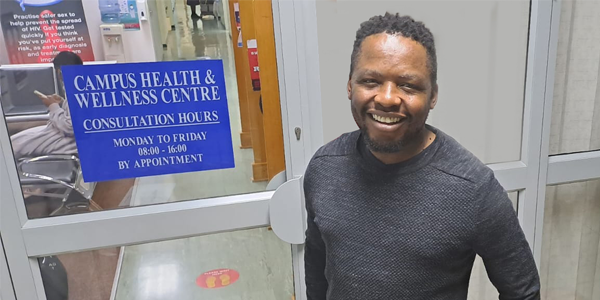New Head for Campus Health and Wellness Centre
- Wits University
This nursing and health activist, and a community builder, looks forward to promoting student health and success on campus.

Tshidiso Ntshabele, who joined Wits’ Campus Health and Wellness Centre on 1 March 2023, has been entrusted with ensuring that the Centre continues to be a top healthcare service provider in the higher education sector and provides efficient, professional and friendly services to the Wits community. This is a task that he is well-prepared for as his experience cuts across the higher education sector and community health, fused with stints in customer service and community policing.
He joins Wits from North-West University where he headed the Health Care Centre. Prior to this he worked at the University of Johannesburg as nurse for five years, a position he landed following years of service at the West-Rand Health District and the City of Johannesburg. His odyssey into nursing is one that came by default.
As a youngster, Ntshabele who matriculated in 2000 from Masupatsela Secondary School, did not immediately proceed to university despite good marks. He attributes this to his background and scarce financial resources. Rather than languishing at home, he pursued his calling to be of service to others and volunteered as a police reservist in Kagiso.
“This experience grounded me on the importance of living for more than just yourself and having impact on the broader society. Sometimes you risk your own life for the good of others,” he says.
During his two years as a police reservist he gained valuable insights about social issues in his community and the need for proper social programmes that reduce poverty, crime and promote social cohesion. Qualities developed from this came in handy when he was offered a learnership at a Call Centre specialising in debt collection.
Accustomed to dealing with people in difficult situations, his professionalism, energy and rapport with clients caught the attention of his supervisor who urged him to do more with his life. In fact, it was this supervisor who showed him adverts of learnerships from the South African Defence Force, the South African Air Force and the Gauteng Department of Health. He successfully passed assessments for all three and was, for the first time, spoilt for choice.
“Nursing won. I chose to permanently save lives and avoid the inevitability of the other professions where you may need to take life.”
He completed his nursing diploma at the Chris Hani Baragwanath Nursing College in Soweto, this was followed by a Postgraduate Diploma in Primary Health Care from North-West University while working at various clinics in West Rand in Gauteng.
In 2011 he moved to work for the City of Johannesburg and had the opportunity to serve in the position as an acting manager. His mentor prompted him to register for a Baccalaureus Curationis (Educationis Et Administrationis): Occupational Health which focuses on the management aspect of healthcare, at the University of Johannesburg. In 2015 he joined UJ’s clinic and thus began his journey in the higher education sector.
He currently serves as a board member of the South African Nursing Council and was elected as Editor in Chief of the South African Association of Campus Health Services, an association that promotes the exchange of information and best practice among member institutions.
Serving Wits
Ntshabele highlights that clinics operating at universities play a key role in the success of students and operate in a complex and pressurised space.
“It’s always important to remember that we service young people. For many, university is a time to explore themselves as they transition to young adults. Consequently, our services must constantly keep up with this ever-changing cohort.”
He is also aware that many of the health issues treated at clinics are social issues and require proactive leadership that engages beyond the clinic, he says.
In his previous job, Ntshabele, a husband and a father of three, hosted ongoing discussions for university male students to effectively address the healthcare needs presented at the clinic. These included talks on reproductive health, injuries suffered from fights and violence, and substance abuse amongst others.
“Most of these are a result of our broken family system and many young men are not equipped with the necessary life skills on how to handle day-to-day challenges.”
He hopes to continue with the mentorship of young men working with internal and external partners.
He also aims to continue advocating for better resourcing of healthcare centres as this impacts the quality and efficiency of services to students experiencing time constraints.
Although the Clinic is primarily geared to serve students, it also attends to all health emergencies on campus, be it staff or visitors.
The Clinic sees about a thousand students a month and has five primary health care nurses, one psychiatric nurse, two paramedics and support staff members responsible for administration and hygiene. The Clinic on the main campus in Braamfontein serves both the West and East Campuses, while the satellite Clinic on the Education Campus serves the Parktown campuses.

